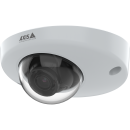
Safer bus travel with Nobina thanks to Axis network cameras.
A scalable and modern camera system has generated significant savings in terms of both time and money.
Mission
Nobina is Sweden’s leading bus company. It develops, sells and provides contracted bus services for more than 20 of Sweden’s transportation companies. The new IP video surveillance system was to replace an existing on-board analogue system. Nobina required a highquality turnkey security video solution which was reliable and secure and which increased safety and security for both passengers and staff. The solution needed to be future-proof, based on an open standard, highly scalable, and capable of being managed and administrated centrally
Solution
Nobina chose Observit BOT, a video surveillance system, together with Axis network cameras. The solution had to be simple to configure and manage while also satisfying Nobina’s requirements for quality and reliability. More than 7,000 cameras were installed on 2,000 buses in total in Denmark, Finland, Norway and Sweden – primarily the AXIS M31 and AXIS P39 Network Camera Series.
Result
Nobina was able to increase safety and security for both their bus passengers and their drivers. The system is easy to install and monitor centrally, eliminating the costly requirement for engineers to manually retrieve data from each individual unit. The new high-definition surveillance system also makes it easy for police to immediately and remotely access high-quality image material in both real time and for forensic review, enabling an effective and timely response. The image material in vehicles can be obtained in real time or downloaded via the network for further analysis.
Observit offers a turnkey solution that gives you complete control of the entire process, from simple installation to monitoring of the cameras in each bus and the collection of image material. The entire process is covered in a highly functional and quality manner.

Need for a modern solution with high-quality cameras
Nobina buses have been rolling on Swedish roads for over 100 years – in the early 1900s under the name “Postens diligenstrafik”. Today, one out of every three bus trips in Sweden is taken with Nobina, which operates in over 100 locations in Sweden. The public transportation companies driving Nobina buses include SL in Stockholm, Västtrafik in Västra Götaland, and Skånetrafiken in Skåne.
A well-functioning security system is an important part of making buses a more attractive choice of public transportation. Nobina wanted to increase safety and security for both its passengers and bus drivers. Nobina’s main demand was a reliable system with cameras that produce very high image quality. The cameras had to be vandal-proof, able to handle difficult and changeable light conditions (both bright sunlight and night darkness), and able to produce sharp images with high recognition of faces and details from a shaky environment since the buses vibrate, make turns, and drive over bumps.
The system also had to be highly reliable, scalable, future-proof, and easily expanded with new add-on services in the future. It had to be easy to use and capable of being managed and administrated remotely from a central location.
Manual handling
Previously, the driver of each bus had to check whether the cameras were working by looking to see whether the lamp was lit red or green. After any bus trip involving an incident or suspected crime, the hard drives had to be manually retrieved from the bus to be able to provide the image recordings to the police. This process was not reliable, cost effective or environmentally sustainable.
Reliable turnkey solution
Nobina has been working with Observit since 2011. Nobina installed network cameras from the AXIS M31 and AXIS P39 series together with Observit’s BOT system for security surveillance, built on open standard and specially designed for transportation vehicles. The system is currently installed on Nobina buses in Denmark, Finland, Norway and Sweden.
Observit BOT is an effective system that makes it easy to install and manage a large number of vehicles and cameras centrally with a high level of reliability –24/7. The system continuously performs self-checks of systems, cameras and functions. All incidents are detected immediately when they occur and are reported to Nobina’s traffic control center. The image material is available to authorized users both in real time – even when the buses are rolling and in service – and in recorded form for later analysis.
Axis network cameras are easy to install and maintain. The cameras are of HDTV quality and can produce sharp color images, even in complicated environments and light conditions. The design is discreet, with cameras that have won awards for their design. They are robust and can withstand vibrations, temperature changes, dust and moisture, and have an anti tampering alarm that signals if someone blocks them or sprays them with paint.
Observit is an Application Development Partner of Axis.
“Axis has extremely reliable products of very high quality, and their cameras can handle all technically difficult environments. Not only is it easy to work with Axis products, it’s also very easy to work with Axis employees,” says Lars Flodén, CEO of Observit.
Safer in service
Nobina has received a scalable and modern system for its buses and obtained significant savings in terms of both time and money. “We are extremely pleased with Observit BOT and Axis cameras. We received a reliable solution that increases security for both our passengers and our bus drivers. In the event an incident does occur, the happenings in the bus are recorded and we can quickly and more efficiently provide better images to the police,” says Bram Lauwers, Product Manager Digital Services at Nobina. “The solution and cameras have also helped to reduce the amount of vandalism in the buses.”

More real-time surveillance and video analysis desirable in public transportation
Organizations working in the public transportation sector want more real-time surveillance and more video analysis functions to increase the safety of drivers and passengers. This is the finding of a global survey conducted by Axis Communications together with the International Association of Public Transport (UITP).
The survey was conducted among public transportation organizations around the world. It shows that most of the companies are interested in using surveillance equipment in real time and advanced video analysis to improve safety for passengers, drivers and equipment on buses, trains, commuter trains, trams, ferries, and subways.
Almost all of the companies surveyed (97 percent) already have security cameras installed, which shows that they realize the importance of video surveillance. Around two-thirds of the companies surveyed currently have network cameras as part of their surveillance system. Over half have a hybrid system with both analog cameras and network cameras. A clear majority say they will consider having network cameras in the future.
More than three-quarters of those who responded to the survey stated that a video surveillance system increases both the actual and the perceived safety of passengers and those working in public transportation, and that this is the biggest gain from the video surveillance system. According to the respondents, video surveillance systems not only help to reduce crime, but also help to reduce the number of accidents and injuries as well as the number of people who try to ride without paying.
86 percent of the respondents said that the most valuable use for video surveillance is being able to provide evidence in cases of incidents. Real-time detection of incidents also ended up high on the list in terms of the benefit provided by this type of security system (72 percent).
“Enabling people around the world to safely and securely get to work or school each day is a top priority for those responsible for public transportation. Video surveillance is one of the most important tools to assist personnel and help public transportation companies meet this goal,” says Alain Flausch, Secretary General of UITP. 80 percent of those working in public transportation are positive or neutral to video surveillance, and 75 percent of passengers are positive or neutral. No one was negative to video surveillance systems.
The majority of the surveyed participants are aware of video detection analysis for unauthorized access, the bypassing of barriers, unauthorized presence on the tracks, as well as smoke and fire. Between 12 and 25 percent of the respondents also make use of this analysis. About half of the respondents are interested in using these types of video solutions as well as solutions such as the detection of graffiti painting, left luggage and facial recognition in the future.
According to the respondents, the biggest challenges in the existing systems are the difficulty in monitoring the large number of cameras in public transportation, followed by poor image quality, technical problems, and resource intensity. The aim of the survey by Axis and UITP was to provide a picture of video surveillance in public transportation, particularly in terms of safety.
Products & solutions

